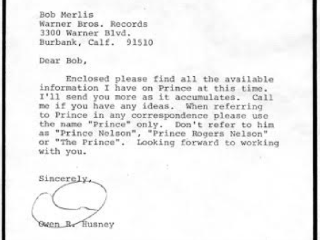Owen Husney has written an engaging book about his journey from Minneapolis to Los Angeles and back. The many people he’s bumped into along the way include geniuses and scoundrels.
 The bookshelf groans happily at the number of intriguing books by rock stars (Pete Townshend, Keith Richards, Elvis Costello, Ray Davies, Neil Young), those who record them (Glyn Johns) and those who manage them (Prince Rupert Lowenstein, Shep Gordon, Lambert and Stamp). The explosion of the rock scene in the 1960s means those who were there are reaching an age to write about it.
The bookshelf groans happily at the number of intriguing books by rock stars (Pete Townshend, Keith Richards, Elvis Costello, Ray Davies, Neil Young), those who record them (Glyn Johns) and those who manage them (Prince Rupert Lowenstein, Shep Gordon, Lambert and Stamp). The explosion of the rock scene in the 1960s means those who were there are reaching an age to write about it.
Husney relates his Minneapolis origin story of being a chubby Jewish kid in a public school run as always by the jocks. The music bug hits him he stumbles into success in a cover band. From there he stumbles into providing services for concert promoters. He folds cold cuts and cheese, and enjoys being backstage listening to the banter of the musicians and managers.
Husney then stumbles into promoting an otherwise moribund Richard Harris tour. Harris is cheating relatively ridiculous success with a seven minute song by Jimmy Webb, which magnificently describes leaving the cake out in the rain. Husney arranges promotion via the seat of his pants, scheduling Harris with local media to drum up ticket sales. Husney astutely notices that middle aged women are Harris’ target audience, so afternoon TV and radio are perfect promotion, costing nothing.
Husney soon takes a call from Jerry Weintraub, promoter or manager of everyone from Neil Diamond to Led Zeppelin. Weintraub wants Husney to handle Elvis Presley‘s two shows in Minneapolis. After Husney arranges security transportation and all the other details, Weintraub flies in a week early and berates Husney for not preparing a bed fit for a king. Husney desperately contacts Moishe, a furniture dealer who charges him $25 to take a 10 foot round bed off his hands, throwing in the pedestal for free. Weintraub is elated when he sees the throne-like bed installed in the hotel suite and consequently invites Husney to the private rehearsal attended otherwise only by Colonel Tom Parker. The kicker? Hunsey arranges with a local Twin Cities radio station to give the bed away in a promotion. Husney is paid $10,000.
Husney befriends the unknown Al Jarreau and gets him gigs opening for unlikely acts like Canned Heat. When given the opportunity to manage Jarreau, Husney gets cold feet. Jarreau performs in LA at the Troubadour, is immediately signed by the legendary Mo Ostin to Warner Brothers and Husney vows he won’t let talent slip through his hands next time.
But what are the chances such a talent will emerge from Minneapolis again?
The meat of the book is how Husney encountered a seventeen year old genius named Prince Rogers Nelson. It is a fascinating story how Husney convinced the captains of Warner Records to allow an unknown artist to not only garner an unprecedented record deal advance, but one that allowed full artistic control. While Prince was recording his first album in the Bay Area, Carlos Santana asks for an introduction. Years later, he would appear with Prince at a scorching gig I attended in Oakland, where the pair outdid each other on a clutch of early Santana tracks. I was unaware of that early connection between the two sterling guitarists.
 Later, on the road sharing a hotel room to do meet and greets for the first album, Prince insisted on sleeping with the radio blasting Parliament, Rick James and other classics. When Husney tried to turn off the radio, Prince responded with a phrase (from my distant relative William Congreve’s observation) that ‘music soothes the savage beast.’
Later, on the road sharing a hotel room to do meet and greets for the first album, Prince insisted on sleeping with the radio blasting Parliament, Rick James and other classics. When Husney tried to turn off the radio, Prince responded with a phrase (from my distant relative William Congreve’s observation) that ‘music soothes the savage beast.’
The run up to the inevitable rift between Prince and Husney is almost heartbreaking, and the rest of the book is comprised of written snapshots of Husney’s further adventures, including a wistful and insightful high school reunion where Husney gets his old band together one last time.

Owen Husney




Recent Comments